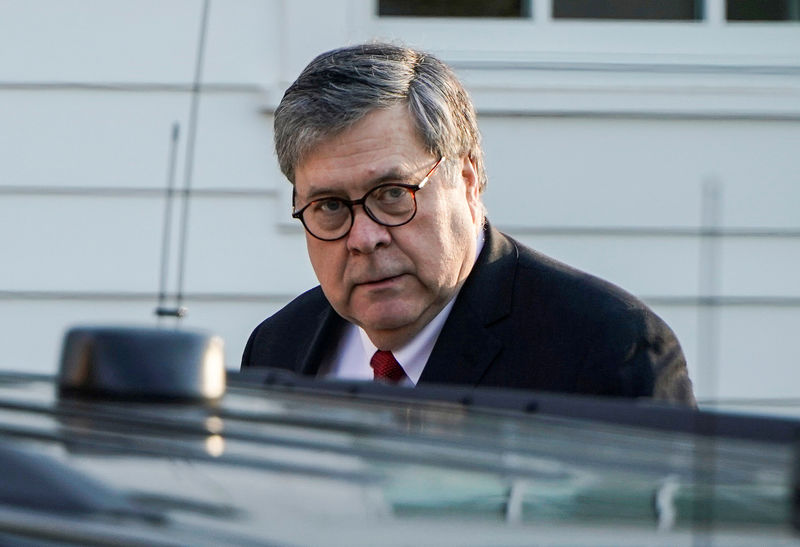By Andy Sullivan and Sarah N. Lynch
WASHINGTON (Reuters) - On Aug. 29, 1991, William Barr had a decision to make.
Cuban inmates had seized hostages inside an Alabama prison in a bid to avoid deportation, and now they were threatening to kill them. Only 19 days into his job as acting attorney general, Barr ordered the FBI to mount a rescue mission.
Before dawn broke the next day, the hostages were freed and the prisoners subdued. Barr's gamble had paid off. Three months later, he was confirmed unanimously by the Senate to serve as nation's youngest attorney general, the top U.S. law enforcement official.
Barr, now 68, is "not afraid to make decisions that fall into his areas of responsibility," said George Terwilliger, who served as Barr's deputy during his first stint as attorney general under President George H.W. Bush.
Barr is back atop the Justice Department, appointed by Donald Trump after the Republican president fired Jeff Sessions as attorney general in November.
Barr is facing a different type of high-pressure situation as he determines how much of Special Counsel Robert Mueller's report on Russia's role in the 2016 election and contacts between Moscow and Trump's campaign should be made public. Department regulations give Barr broad authority to decide what to disclose and what to withhold.
So far, all Barr has released since Mueller submitted the nearly 400-page report on March 22 is a four-page letter, made public two days later, describing the special counsel's main conclusions.
Barr wrote that Mueller had not concluded that Trump's campaign engaged in a criminal conspiracy with Moscow. Barr also said he personally decided after reviewing the report that Mueller did not find enough evidence to show that Trump committed the crime of obstruction of justice.
That assessment has drawn sharp criticism from Democrats. In addition, some members of Mueller's team are spreading the word that they are unhappy with the way Barr characterized their work, according to media reports.
The public is likely to get a greater look at the factors behind Barr's decision to clear Trump of obstruction of justice - Mueller had not exonerated Trump - and other investigative details when the attorney general releases a redacted version of the report, which he has promised by mid-April.
For some, that will be too late, considering that all the public knows about the findings in a 22-month inquiry that cast a cloud over Trump's presidency is the little that Barr has already disclosed.
"It is like fundamentally rigging the game before we know what the actual score is," said Harvard Law School professor Laurence Tribe, who worked with Barr on a telecommunications case in the 1990s. "His integrity, his history, his reputation is shattered by what he has done. I have no idea what could have motivated him."
'AN IMPRESSIVE EFFORT'
Others have said Barr made the right decision on the obstruction question, noting that it is difficult to prove that Trump committed criminal obstruction if Mueller did not find that he destroyed evidence or directly interfered with the investigation - even though he assailed the inquiry as a "witch hunt" and called the investigators partisan zealots.
"Trump made an impressive effort at creating an obstruction case against himself, but it's no easy task to obstruct an investigation where prosecutors do not believe there's an underlying crime," George Washington University law professor Jonathan Turley said.
Parts of the report are expected to be blacked out to protect information deemed sensitive. Barr, with Mueller's assistance, has spent weeks redacting material that might compromise ongoing investigations or intelligence-gathering sources and methods. Barr has said he is also removing material from grand-jury proceedings that by law can be made public only through a court order.
Barr also may opt to redact portions that discuss people who were investigated but not charged such as Trump's son-in-law Jared Kushner. That would fit with longstanding Justice Department policy, but could draw criticism from Democrats who have said the public should know as much as possible about Trump campaign contacts with Russia during and after the 2016 election.
Trump has said he will not use a legal doctrine called executive privilege, which allows a president to withhold information about internal executive branch deliberations from other branches of government, to block portions of the report. Barr has said he does not plan to submit the report to the White House for review.
"Bill Barr is going to call it like he sees it," said Wayne Budd, who served as the Justice Department's third-ranking official during Barr's first stint as attorney general.

"I think he understands the role of the attorney general is not as a lawyer for the president," Budd added, "but as a lawyer for the people of the United States."